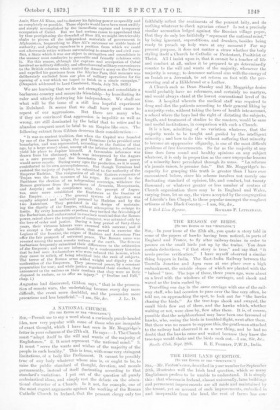A NATIONAL CHURCH . [To TEE EDITOR OF THE "SPECTATOR.") SIE, — Permit
me to say a word about a curiously puzzle-headed idea, now very popular with some of those who are incapable of exact thought, which I have last seen in Mr. Moggridge's letter in your columns of the 27th ult. He says :-1. The Church must "adapt itself to the will and wants of the majority of Englishmen." 2. It must represent -"the national mind." 3. It must "servo the wants and wishes of the majority of the people in each locality." This is true, with Home very stringent limitations, of a body like Parliament. ' It cannot be possibly true of any body whatever whose aim is, or ought to be, to raise the public standard of thought, devotion, and morals permanently, instead of itself fluctuating according to that standard's variations. I put out of the question all purely ecclesiastical ideas, and simply rest the debate on the educa- tional character of a Church. Is it not, for example, one of the most cogent arguments against the working of the Roman Catholic Church in Ireland, that the peasant clergy only too
faithfully reflect the sentiments of the peasant laity, and do nothing whatever to check agrarian crime P Is not a precisely similar accusation lodged against the Russian village popes, that they do only too faithfully " represent the national mind," by being ignorant, superstitious, and drunken, besides being ready to preach up holy wars at any moment ? For my present purpose, it does not matter a straw whether the body styling itself a Church be Catholic or Protestant, Positivist or Theist. All I insist upon is, that it cannot be a teacher of life and conduct at all, unless it be prepared to go determinedly counter to the will and wants of the majority, whenever the majority is wrong; to denounce national sins with the energy of an Isaiah or a Jeremiah, to set reform on foot with the per- severing zeal of a Hildebrand or a Luther.
A Church such as Dean Stanley and Mr. Moggridge desire would probably have no reformers, and certainly no martyrs, and would always stand at the lowest conventional level of its time. A hospital wherein the medical staff was required to drug and diet the patients according to their general liking by a majority-vote, without taking the laws of health into account, a school where the boys had the right of dictating the subjects, length, and treatment of studies to the masters, would be sane and useful institutions, in comparison with such a Church.
It is a law, admitting of, no variation whatever, that the majority needs to be taught and guided by the intelligent minority ; and how to do this without suffering that minority to become an opppressive oligarchy, is one of the most difficult problems of free Governments. So far as the majority at any time does form sound and healthy opinions on any subject whatever, it is only in proportion as the once unpopular lessons of a minority have percolated through its mass. " La reform° n'a jamais raison, to premier foie." But Mr. Moggridge's in- capacity for grasping this truth is greater than I have ever encountered before, since his scheme involves not merely one fluctuating standard of opinion, life, and conduct, but twenty thousand ; or whatever greater or less number of centres of Church organisation there may be in England and Wales, varying from, let us say, the views accepted by the congregation of Lincoln's Inn Chapel, to those popular amongst the roughest artisans of the Black Country.—•I am, Sir, &c.,
































 Previous page
Previous page